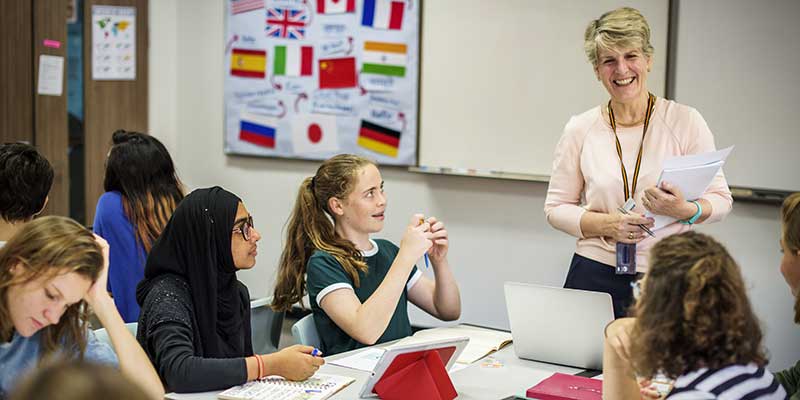
Language acquisition
The earliest stages of foreign language learning
Researchers: Leah Roberts and Emma Marsden
Department of Education
Researchers working on projects in this area investigate the initial stages of language learning through laboratory-based, classroom-based, and naturalistic language learning.
- Charting the first hours of foreign language learning in the classroom (MS Word
 , 4,177kb) (Leah Roberts with Emma Marsden)
, 4,177kb) (Leah Roberts with Emma Marsden) - Japanese children’s second language (L2) identity development (PhD student, Keita Takashima)
- Learning novel morphology: Cross-modal priming (Emma Marsden with John Williams (University of Cambridge)
- Processing for acquisition: The effect of surprisal on the acquisition of syntactic structure. (Emma Marsden and Giulia Bovolenta). Read more about Processing for acquisition
- The creation of a suitable syllabus for young language learners (PhD student, Geneffa Ahmed Virjee)
- The first 7 minutes of exposure to a new language (MS Word
 , 4,179kb) (Leah Roberts with Marianne Gullberg, Lund University; Christine Dimroth, University of Osnabrük; Peter Indefrey, University of Dusseldorf)
, 4,179kb) (Leah Roberts with Marianne Gullberg, Lund University; Christine Dimroth, University of Osnabrük; Peter Indefrey, University of Dusseldorf)
Sleep and word learning in typical and atypical development
Researchers: Lisa Henderson and Gareth Gaskell
Department of Psychology
Sleep is known to affect the consolidation process that takes fragile memories and makes them robust. However, little is known about how children's sleep may influence consolidation.
We have been carrying out research to develop theories of typical and atypical language consolidation and forgetting across wake and sleep, drawing on variability in both sleep and language profiles in disorders such as autism, dyslexia, and developmental language disorder. The theoretical applications of the planned research have the potential to improve our practical understanding of how to make memories stick in children and adults, and ultimately improve outcomes. For example, we have been investigating how to optimise long-term memory retention by manipulating the time between learning and sleep and through retrieval practice and spaced testing.
Read more about 'Memory consolidation in typical and atypical development'
The onset of word learning in infants
Researchers: Tamar Keren-Portnoy, Marilyn Vihman and Rory A. DePaolis
Department of Language and Linguistics
Grammatical meaning and the second language classroom
Researcher: Heather Marsden and Roumyana Slabakova
Department of Language and Linguistic Science
Inherent in an attempt to bring knowledge from formal linguistic research to the language classroom is an assumption that this knowledge could affect learners’ unconscious development in their second language (L2).
The question of whether there is or is not an interface between language instruction and the development of unconscious language knowledge is a topic of ongoing debate.
Some research conveys an optimism that unconscious L2 knowledge may be affected by explicit instruction. In the case of most of the properties treated in these papers, knowledge of the properties under investigation is evident by advanced proficiency levels, and the authors are suggesting that explicit instruction could speed up and make instruction more efficient.
However, if it turns out that unconscious L2 knowledge is, in fact, impervious to instruction, then it would be all the more crucial that instruction materials are as accurate as possible in terms of their linguistic descriptions. It is by no means straightforward to create teaching materials that are both as fully linguistically accurate as possible and also suitably accessible for the learners. Nonetheless, as language learners would be well served by such an endeavour, we conclude with an exhortation for further collaboration by language teachers and linguistic researchers, to make findings from generative linguistics available for language teaching.
Read 'Grammatical meaning and the second language classroom'
More projects
Additional language acquisition projects
- Psycholinguistic methods and the L2 German classroom: Heather Marsden, Thomas Jochun-Critchley (Language and Linguistic Science), Emma Marsden (Education), with Vivienne Rogers (Swansea), Holger Hopp (Technische Universität Braunschweig), Carrie Jackson (Penn State)
- Grammatical aspect in Japanese as a third language: Akbar Hendra (PhD student, Education/Language and Lingusitic Science), Heather Marsden (Language and Linguistic Science)
- Exploring factors that influence grammatical generalisation within a statistical learning framework: Jelena Mirkovic (Psychology University of York and York St John), Emma Hayiou-Thomas (Psychology), Amanda Hickey (PhD student, Psychology) and Joseph Vogliqi (PhD student, Psychology), Isabelle O'Halloran (PhD student. York St John's)
- Sound symbolism in mothers' speech to their infants: Tamar Keren-Portnoy, Catherine Laing and Shayne Sloggett (Language and Linguistic Science) with Ghada Khattab (Newcastle University)
- L2 Phonological development with written input: The influence of L1 Literacy experience on L1 Arabic acquisition of English: Louise Shepperd (PhD student, Education), Leah Roberts (Education), Sam Hellmuth (Language and Linguistic Science)
- Factors affecting the variable adaptation of English loanwords in Arabic: Areej Alenazi (PhD student, Language and Linguistic Science), Sam Hellmuth (Language and Linguistic Science)
- Encoding experiences in first and second language comprehension: Nino Grillo, Heather Marsden, Nina Radkevich, Shayne Sloggett, George Tsoulas, Norman Yeo (Language and Linguistic Science) with Kook-Hee Gil (University of Sheffield)
